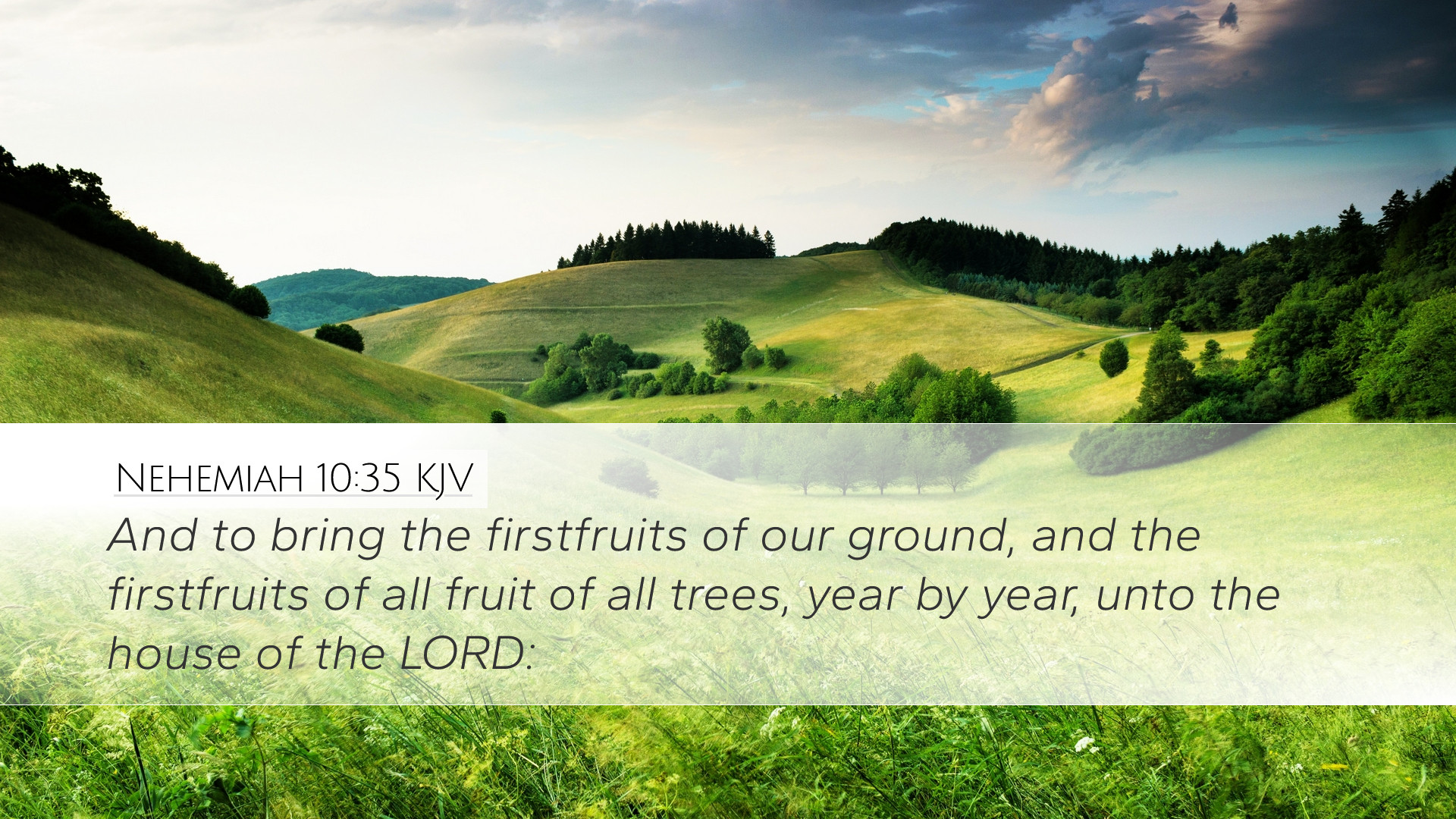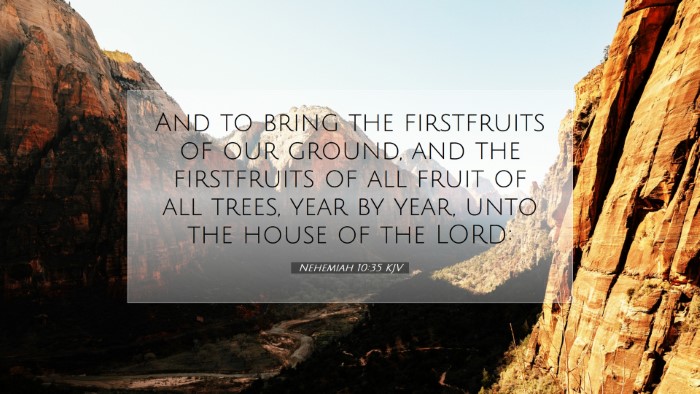Commentary on Nehemiah 10:35
Verse Context: Nehemiah 10:35 states: "And to bring the firstfruits of our ground, and the firstfruits of all fruit of all trees, year by year, unto the house of the Lord."
This verse is part of a covenant that the people of Israel made as they sought to restore their commitments to God following their return from Babylonian exile. In this passage, they express their devotion by pledging to bring their firstfruits to the temple. This commitment is deeply rooted in their laws and traditions, symbolizing their reliance on God as the ultimate provider.
Insights from Public Domain Commentaries
Matthew Henry's Commentary
Matthew Henry emphasizes that the commitment to bring the firstfruits is an act of gratitude towards God. It highlights the principle of giving God the first and the best of one's increase. Henry notes that this practice was significant in the Jewish law, establishing a sense of priority in one's life, reflective of their faith.
He elaborates on the importance of the firstfruits as a tangible expression of faith; by bringing the first of their crops and fruits, the people acknowledged God's providence and sovereignty over their land and its yield. This act also served as a reminder of God's past blessings, reinforcing a culture of remembrance and thankfulness among the people.
Albert Barnes' Notes
Albert Barnes provides significant insights into the historical context of this verse. He notes that the act of offering firstfruits was well established in the Jewish tradition, pointing out references in the Mosaic Law (Exodus 22:29; Deuteronomy 26:2). Barnes states that this offering was not just a material contribution but a spiritual commitment to honor God with their possessions.
Additionally, Barnes observes that this offering was expected to be made annually, emphasizing the continual nature of their dedication to God. This perpetual offering not only ensured the sustenance of the temple and its ministers but also reinforced the people's identity as God’s chosen people, dedicated to His service.
Adam Clarke’s Commentary
Adam Clarke highlights the theological implications of bringing the firstfruits to the Lord. He asserts that the practice of offering the firstfruits reflects a broader principle in Scripture — the idea of dedication and the sanctification of what we have. Clarke emphasizes that this devotion to God’s work was a form of worship that recognized the divine source of all blessings.
He weighs the spiritual symbolism inherent in the firstfruits, interpreting it as an act of faith in God's future provision. By committing their first harvests to God, the Israelites exhibited trust that God would continue to bless their land, fostering a deeper reliance on His faithfulness.
Theological Reflections
The act of bringing firstfruits highlights several theological themes pertinent to contemporary faith practice:
- God's Sovereignty: Offering firstfruits acknowledges that God is the ultimate source of all blessings and provisions.
- Faith and Trust: These offerings symbolize an expression of trust that God will provide for their needs in the future, showcasing a proactive faith.
- Gratitude and Commitment: The consistent practice of giving back to God evidences an eternal gratitude and commitment to God’s kingdom and work.
- Community and Responsibility: As a covenant community, the Israelites recognized their collective responsibility to support the spiritual leaders and maintain the worship of God.
Application for Pastors and Theologians
This verse and its commentary present profound lessons for church leaders and biblical scholars:
- Teaching Generosity: Pastors can use this verse to teach the significance of sacrificial giving and, more importantly, the spirit of gratitude in their congregations.
- Encouraging Faith Practices: The continual nature of offering firstfruits can inspire churches to establish regular practices that honor God and foster faith.
- Creating a Culture of Remembrance: Scholars can explore how historical practices of thankfulness can inform contemporary worship and community life.
- Recognition of God’s Provision: This passage serves as a reminder in pastoral care of the importance of recognizing and celebrating God's blessings in congregational life.
Conclusion
Nehemiah 10:35 serves as a potent reminder of the principles of gratitude, trust, and community in the life of faith. It draws the connection between the tangible offerings of firstfruits and the deeper spiritual truths about God’s provision and sovereignty. In examining past practices, modern believers can glean wisdom for their own spiritual journeys and community life, ensuring that they too bring their first and best to God.


